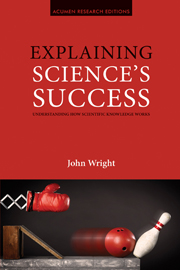Book contents
- Frontmatter
- Contents
- 1 Some surprising phenomena
- 2 Some unsatisfactory explanations of the phenomena
- 3 A defeasible a priori justification of induction
- 4 The independence of theory from data
- 5 Some more success-conducive properties of theories
- 6 Newton's laws of motion and law of gravitation
- 7 Special relativity
- 8 Mendelian genetics
- 9 Conclusion
- Notes
- Bibliography
- Index
3 - A defeasible a priori justification of induction
- Frontmatter
- Contents
- 1 Some surprising phenomena
- 2 Some unsatisfactory explanations of the phenomena
- 3 A defeasible a priori justification of induction
- 4 The independence of theory from data
- 5 Some more success-conducive properties of theories
- 6 Newton's laws of motion and law of gravitation
- 7 Special relativity
- 8 Mendelian genetics
- 9 Conclusion
- Notes
- Bibliography
- Index
Summary
We are seeking an explanation for certain types of scientific success. If we refer to the class of relevantly successful theories as S, the explanation of their success can be represented as:
Explanans: The members of S possessed certain properties M, where those properties M were known to scientists prior to the subsequent success of the theories.
Explanandum: The theories in S went on to enjoy subsequent surprising success.
What is the nature of the explanatory or inferential link that takes us from the explanans to the explanandum? In the previous chapter it was argued that it seemed unlikely that empirical science could provide us with a satisfactory explanation. On the face of it, the only other way of generating an explanation would appear to be by establishing some sort of a prioristic link between the explanans and the explanandum. That is, what is required is some sort of a prioristic argument establishing that if the members of S had certain properties known prior to their success, then the members of S would be, or at least would have an increased probability of being, subsequently successful.
An a prioristic argument of this sort is (one form of) what is standardly referred to as justification of induction. But the problem of justifying induction is one of the main problems of epistemology. It is a problem that many philosophers are perhaps inclined to put in the “too hard basket”.
- Type
- Chapter
- Information
- Explaining Science's SuccessUnderstanding How Scientific Knowledge Works, pp. 38 - 56Publisher: Acumen PublishingPrint publication year: 2012



